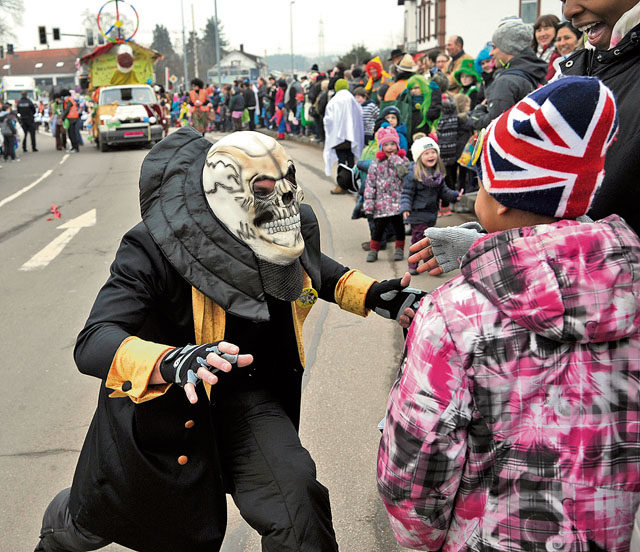
An individual in costume scares the spectators along the route of last year’s Fasching parade in Ramstein-Miesenbach. This year’s parade starts at 2 p.m. Tuesday.
Fasching, Germany’s “crazy season” continues through Tuesday with masquerade balls, dances, children’s parties and comedic performances.
A special Fasching highlight are the Rose Monday parades. The most famous ones are those leading through the main Fasching cities of Mainz, Köln and Düsseldorf. Spectators from Germany and throughout Europe come to these cities to watch the annual spectacle with decorated floats, bands, dancing and marching groups. Participants in vehicles throw out candy or hand out drinks to the crowds along the streets. It is traditional for revelers to sing, sway and dance during the five-hour parades which all start at 11:11 a.m.
The official Fasching greeting in Köln is “Alaaf,” and in Mainz and Düsseldorf, it’s “Helau.”
Kaiserslautern will have no parade, but a Rose Monday party starting at 11:11 a.m. in the center of town on Schillerplatz.
The day is called Rose Monday because the organization committee of the Köln parade, which was founded in 1824, had its general membership meetings on Monday after the so-called Rose Sunday, also known as mid-lent Sunday or Laetare Sunday. Originally this day was the third Sunday before Easter. Since the eleventh century, the Pope dedicated a Golden Rose to a deserved personality that day. Since 1830, the day was called Rose Monday.
In order not to compete with the big Rose Monday parades, Ramstein-Miesenbach has its parade Shrove Tuesday. The official Fasching shout is “Ralau.”
“Our parade with more than 1,1000 participants consisting of 12 carnival associations and more than 21 floats and 40 walking groups will start at 2 p.m. on August-Suessdorf-Strasse and lead through the town,” said Hartmut Schaeffner, chief of the parade committee. “Also, 9 music bands including the U.S. Air Forces in Europe Dixie Band will walk in the parade, that will be about 2 hours long.”
More than 50,000 promoting items to include candies will be tossed to spectators along the 2.4 km route. Food and beverage booths will be set up. To be able to finance each year’s parade, vendors will be out in the streets selling parade buttons for €2 to spectators. These buttons grant free admission to the Fasching party, which takes place after the parade at the Haus des Buergers.
“Our Fasching Princess Sara I and the Ramstein Carnival Association will invite everybody to have a good time,” Schaeffner said. “We are asking parents to watch their children and for safety reasons, spectators should not get too close to the floats.”
Tuesday, the center of Ramstein-Miesenbach and Bahnhofstrasse will be closed to motorized vehicles from noon to 8 p.m.
Smaller Fasching parades in the Pfalz will be Sunday at 1:11 p.m. in Schoenenberg-Kuebelberg, 1:30 p.m. in Leimen and Dahn, 2:11 p.m. in Linden, and 3 p.m. in Krottelbach.
Many towns offer outdoor Fasching events on Shrove Tuesday. Stages are put up, where local carnival associations entertain visitors with presentations by their dance groups and members holding humorous speeches. Often the council members of the carnival associations invite prominent personalities of the town including the mayor to come on stage to make fun of them.
In Kaiserslautern, a stage is set up near the Rathaus (city hall). The local Fasching association, KVK, will present its Fasching princess, dancing groups and other members. The official shout is “Kalau.”
A Fasching carnival with rides and booths takes place Saturday through Tuesday near Stiftskirche.
In most German states, children are excused from school Shrove Tuesday and workers take off in the early afternoon. In most cases, employers allow them to do so, and stores, banks and official institutions close anyhow at 1 or 2 p.m. Tuesday.
Ash Wednesday will end the crazy season. Carnival association members and party-goers meet one more time for their traditional “Heringsessen,” the eating of herring. The herring is supposed to help ease hangovers. Also on Ash Wednesday, Lent, a 40-day fasting period for Roman Catholics starts.


